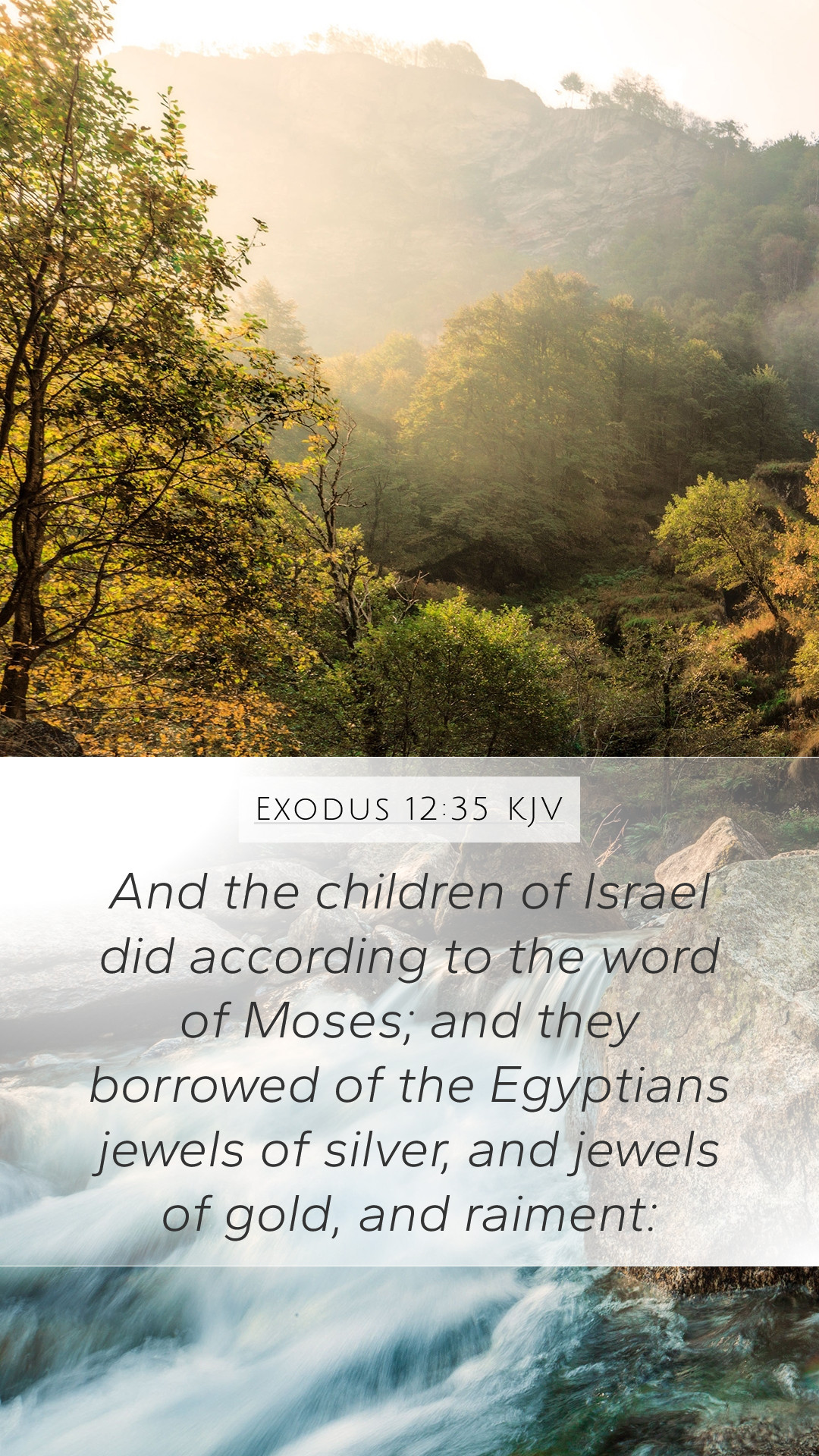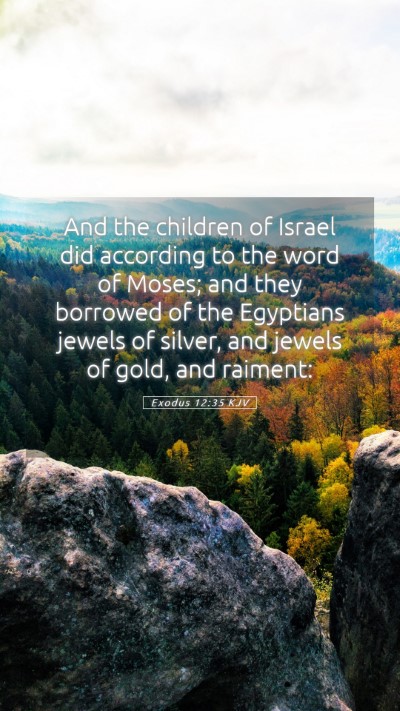Understanding Exodus 12:35
Exodus 12:35 states, "And the children of Israel did according to the word of Moses; and they borrowed of the Egyptians jewels of silver, and jewels of gold, and raiment:"
This passage marks a significant moment in the Exodus narrative, where the Israelites take essential items from the Egyptians as they prepare to leave slavery in Egypt. This action not only fulfills God’s promise to Abraham regarding his descendants but also highlights themes of divine provision and justice.
Bible Verse Meanings
The meaning of this Bible verse can be unpacked through various commentaries. According to Matthew Henry's Commentary, the act of borrowing here is not a typical transaction but an act orchestrated by God to ensure that the Israelites left Egypt with resources. This borrowing symbolizes the transfer of wealth from the oppressor to the oppressed, fulfilling God's promises to His people and serving as a foretaste of the blessings that would follow their liberation.
Albert Barnes provides insight into the nature of the items borrowed. The "jewels of silver and gold" mentioned are of significant worth, emphasizing that the Israelites were to leave Egypt not as impoverished slaves but as a people enriched by God's favor. This also speaks to the justice of God, as the plundering of the Egyptians serves as recompense for the years of hard labor endured by the Israelites.
Adam Clarke's Commentary elaborates that this act of borrowing was divinely instituted. It follows God's judgment upon Egypt, signaling that the time has come for the Israelites to step into their destined land of promise. This clear directive from God also suggests that moral boundaries are sometimes transcended in the context of divine providence.
Insights from the Verse
- Divine Providence: The events leading up to this moment are deeply rooted in the providential care of God for His people.
- Restorative Justice: The Israelites' acquisition of wealth from the Egyptians represents a restoration of balance after years of oppression.
- Faith and Obedience: The obedience of the Israelites to follow Moses' instructions reflects a profound faith in God’s plan.
Historical Context
Understanding Scripture in Exodus 12:35 requires an awareness of the historical and cultural contexts. The narrative takes place during the final days of the Israelites' bondage in Egypt, a context filled with oppression and strife. This moment marks a pivotal shift not only in their status as slaves but also in their identity as God's chosen people being prepared for deliverance.
Exodus 3:21-22 provides foundational context as God declares that the Israelites will ask the Egyptians for silver and gold, affirming the prophetic word spoken to Abraham regarding his descendants. This tie serves to solidify the unwavering faithfulness of God to His promises.
Application of the Verse
The significance of Exodus 12:35 extends beyond a mere historical reference; it invites contemporary readers to reflect on God's justice and provision. Just as the Israelites were called to step into their freedom with resources provided by God, Christians today are reminded that God's plans often involve preparation for a future filled with hope and purpose.
Applying this scripture to daily life involves recognizing God's hand in our journeys, especially during times of transition. Trusting in divine guidance can lead to restoration, empowering believers to step boldly into the lives God has prepared for them.
Related Bible Cross References
- Exodus 3:21-22: God's promise to the Israelites for favor from the Egyptians.
- Exodus 11:2: The command to ask for valuables before the final plague.
- Psalms 105:37: The depiction of God's deliverance of Israel with wealth.
- Deuteronomy 15:13-14: Instructions on how to treat freed servants and sharing wealth.
- Hebrews 11:24-26: The faith of Moses in identifying with God's people over earthly treasures.
Conclusion
By exploring Bible verse interpretations through detailed scholarly analysis, believers can find rich insights in passages like Exodus 12:35. The understanding of Scripture is not only about the words on the page but about the living application of those words in today’s context. As Bible study groups and individuals engage in these discussions, they unearth valuable lessons regarding faith, provision, and the journey toward freedom.


